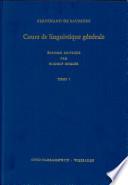Cours de Linguistique générale, 1913
Œuvres

Cours de linguistique générale
Ferdinand de SaussureFerdinand de Saussure citations célèbres
“La valeur de n'importe quel terme est déterminée par ce qui l'entoure.”
Cours de Linguistique générale, 1913
Cours de Linguistique générale, 1913
À propos de la langue.
Cours de Linguistique générale, 1913
Cours de Linguistique générale, 1913
Cours de linguistique générale (1916)
Ferdinand de Saussure: Citations en anglais
“Speech has both an individual and a social side, and we cannot conceive of one without the other.”
Source: Cours de linguistique générale (1916), p. 9
Source: Cours de linguistique générale (1916), p. 16 ; Partly cited in; Geza Revesz, The Origins and Prehistory of Language, London 1956. p. 126
Source: Cours de linguistique générale (1916), p. 112
Contexte: The characteristic role of language with respect to thought is not to create a material phonic means for expressing ideas but to serve as a link between thought and sound, under conditions that of necessity bring about the reciprocal delimitations of units. Thought, chaotic by nature, has to become ordered in the process of its decomposition. Neither are thoughts given material form nor are sounds transformed into mental entities; the somewhat mysterious fact is rather that "thought-sound" implies division, and that language works out its units while taking shape between two shapeless masses. Visualize the air in contact with a sheet of water; if the atmospheric pressure changes, the surface of the water will be broken up into a series of divisions, waves; the waves resemble the union or coupling of thought with phonic substance.
“Time changes all things; there is no reason why language should escape this universal law.”
Source: Cours de linguistique générale (1916), p. 77
Contexte: The causes of continuity are a priori within the scope of the observer, but the causes of change in time are not. It is better not to attempt giving an exact account at this point, but to restrict discussion to the shifting of relationships in general. Time changes all things; there is no reason why language should escape this universal law.
“Without language, thought is a vague, uncharted nebula.”
Source: Cours de linguistique générale (1916), p. 111-112
Source: Course in General Linguistics
Contexte: Psychologically our thought-apart from its expression in words-is only a shapeless and indistinct mass. Philosophers and linguists have always agreed in recognizing that without the help of signs we would be unable to make a clear-cut, consistent distinction between two ideas. Without language, thought is a vague, uncharted nebula. here are no pre-existing ideas, and nothing is distinct before the appearance of language.
Source: Cours de linguistique générale (1916), p. 111-112
Source: Course in General Linguistics
Contexte: Psychologically our thought-apart from its expression in words-is only a shapeless and indistinct mass. Philosophers and linguists have always agreed in recognizing that without the help of signs we would be unable to make a clear-cut, consistent distinction between two ideas. Without language, thought is a vague, uncharted nebula. here are no pre-existing ideas, and nothing is distinct before the appearance of language.
Source: Cours de linguistique générale (1916), p. 120
Source: Cours de linguistique générale (1916), p. 6
Source: Cours de linguistique générale (1916), p. 33; as cited in: Adam Schaff (1962). Introduction to semantics, p. 9
“Language is a system whose parts can and must all be considered in their synchronic solidarity.”
La langue est un systéme dont toutes les parties peuvent et doivent être considérés dans leur solidarité synchronique.
Source: Cours de linguistique générale (1916), p. 87 (1916, p. 124; Part 1, Ch. 3, sec. 3.)
Source: Cours de linguistique générale (1916), p. 101
Source: Cours de linguistique générale (1916), p. 103
Ferdinand de Saussure (1910), Saussure's Third Course of Lectures on General Linguistics (1910-1911) https://www.marxists.org/reference/subject/philosophy/works/fr/saussure.htm, Pergamon Press, 1993.
Source: Cours de linguistique générale (1916), p. 157; as cited in: Schaff (1962:11)
“Writing obscures language; it is not a guise for language but a disguise.”
Source: Cours de linguistique générale (1916), p. 31
Similarly, in the matter of language, one can separate neither sound from thought nor thought from sound; such separation could be achieved only by abstraction, which would lead either to pure psychology, or to pure phonology.
Source: Cours de linguistique générale (1916), p. 157; as cited in: Schaff (1962:11)
